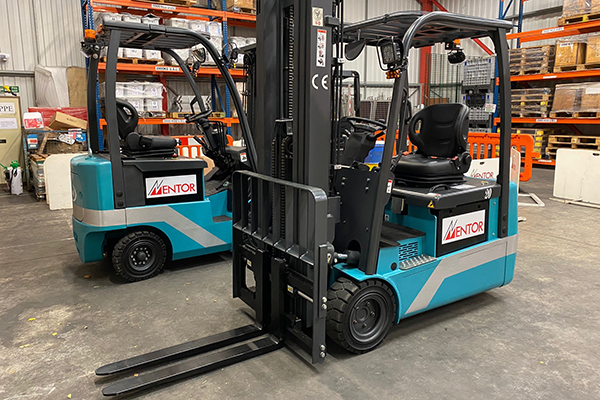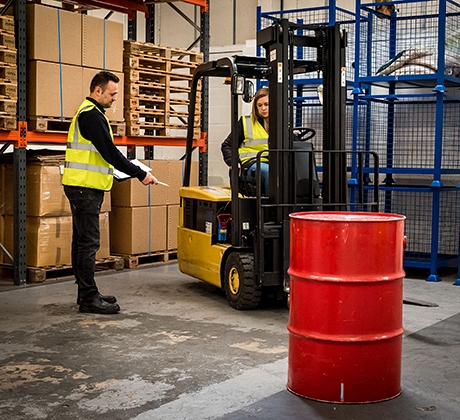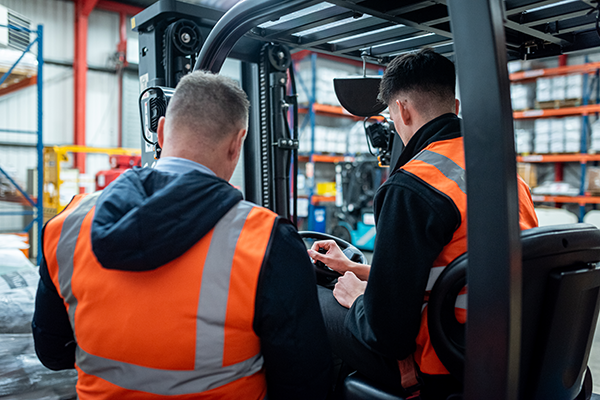
Forklift Training Experience Levels: A Complete Guide
This is a complete guide to forklift training experience levels. We cover novice, experienced, refresher and conversion training.
With unmatched expertise and over 35 years’ experience, we are ready to answer your burning questions about material handling training and safe operation.
Select a question from the list below to find the answer and don’t hesitate to contact us if you need more information.
Yes. The legislation covering this is the Health & Safety at Work Etc Act, 1974, and Regulation 9 of the Provision and Use of Work Equipment Regulations 1998 (PUWER). In a nutshell, this requires that every employer ensures that all persons who use lift trucks, and those that supervise them, have received adequate training.
Details regarding the required structure and standard of this training can be found in Approved Code of Practice L117.
Training is essential for part-time operators of any lift truck. Legally they need the same type and amount of training as a full-time operator, as they face the same risks. Regardless of working patterns or contracts, employers have the same duty of care to all operators.
All the usual course durations and testing standards would apply (dependant on experience levels and the total number of delegates attending the course).
Yes. A laden-powered pallet truck can often weigh more than double the weight of a family-sized car and crushing accidents involving legs, feet and ankles are, sadly, commonplace.
It’s important that anyone operating any kind of MHE understands the risks involved and how to keep themselves and others safe. It is also a firm requirement under PUWER regulations.
This is definitely not the case. Approved Code of Practice L117 states that additional conversion training is a requirement. This training will help to ensure that all gaps in and variants on existing skills and knowledge are covered.
Any employer who allows an operator to drive workplace transport on which they have not received proper training, puts their people and their business at risk.
Most certainly. Mentor provides a service to its customers, maintaining records of training on their behalf for a minimum of seven years.
When choosing Mentor, you can rest assured that your documentation is going to be safely stored.
Course durations are determined by a number of factors. Accredited training courses are required to meet relevant safety and legal standards and, to do so, must cover certain subject areas specified by accrediting bodies and legislations. Truck capacity, delegate numbers and experience levels also play a factor.
Accredited course lengths are specified by the Accrediting Bodies Association for Workplace Transport. Unaccredited courses are not subject to the same consistent standards and therefore can be more flexible in duration.
It is important to note that there is no such thing as a forklift ‘licence’ in the UK. Instead, certificates are awarded once training has been completed. However, these certificates do not have expiry dates but, in line with best practice, all forklift operators should receive regular refresher training to reassess their abilities and reinforce good driving habits.
This is specified in Approved Code of Practice L117, with retraining/retesting suggested every three to five years. Ultimately, the frequency of refresher training will come down to your company’s own refresher policy.
As well as providing our customers with trusted training to assured standards, we aim to provide further support to the wider industry. Putting our industry expertise to good use, we’ve collated useful information, resources, safety campaigns and more, to help UK businesses remain safe, compliant and profitable. Take a look at the downloads below, which include fact sheets, reports and safety posters, all available to access for free.
The ABA are making changes to their grouping categories, due to come into effect 19th Jan 2026.
Find out how we worked with Wolseley to provide a blended learning solution for their counterbalance operators
Take a look at the results and best practice guidance from our 2024 Forklift Safety and Training survey.
This case study details how we have worked with GXO Logistics to help them keep their operations safe, compliant and profitable.
A single-page fact sheet covering the key areas of the Management of Health and Safety at Work Regulations 1999.
The L117 Approved Code of Practice includes an outline of the main legal requirements relating to lift trucks.
A one-page fact sheet on the key LOLER regulations you need to be aware of to maintain safety.
A one-page fact sheet on segregation and forklift awareness, highlighting the importance of safe systems of work.
A simple guide to operator monitoring methods for those managing forklift operations.
A single-page fact sheet covering the key sections of L117. This guidance ensures your operations are safe and compliant.
A one-page guide to your responsibilities under the Health & Safety at Work etc. Act 1974.
A one-page fact sheet covering the key regulations of PPEWR, including the provision of PPE and further requirements.
A simple two page guide to meeting your responsibilities for management training under L117.
A one-page fact sheet on checking evidence of training for new starters, including specific requirements for different types of workers.
Our TILE poster is a reminder of key considerations for reducing the risk of a manual handling injury.
The L117 Approved Code of Practice includes an outline of the main legal requirements relating to lift trucks.
This poster provides a great reminder for your operators of the safest way to mount and dismount a forklift truck.
A one-page fact sheet on the main PUWER 1998 regulations you need to be aware of, to ensure safe operations.
Exclusive report revealing shocking statistics from our recent survey and best practice guidance for reducing risk on your site.
The AITT Method Statement provides AITT guidance on carrying out MHE training safely during the COVID-19 Outbreak .
This poster will help keep your site safe with this handy reminder for crane operators: never leave a suspended load unattended.
This free download provides a detailed list of accredited training courses available nationwide.
This free resource provides a quick and easy guide to our pre-use inspection system for forklift trucks.
Our Lorry Loader Safety poster is a free resource designed to help lorry loader operators work safely around pedestrians.
Take a look at our comprehensive collection of best practice guidance to deepen your understanding and make sure you’re meeting your responsibilities for safety. If you find any gaps in your knowledge, chances are we have the resources you need to fill them. If you can’t find what you’re looking for, contact one of our expert advisors – they’ll be happy to help.

This is a complete guide to forklift training experience levels. We cover novice, experienced, refresher and conversion training.

We have put together a handy checklist for managers and supervisors to use while overseeing MHE operation in hot weather conditions.

Forklift operations can be disrupted in many different ways, potentially leading to serious accidents and injuries.

Damaged racking is a clear indicator that unsafe operation is present within your site. We explain how to combat the main causes of it.

We explain the link between operational risk and refresher training frequency when it comes to forklift trucks on your site…

Ensure your forklift training plan covers all the essential areas with our quick checklist. Read the full guidance here…

During busy periods many sites experience a surge in workforce numbers, during these times you must ensure that relevant measures are in place.

Forklift operators play a pivotal role in maintaining on-site safety. There are certain requirements employees must meet.
Join our monthly Safety Net newsletter for compliance tips and industry insights.